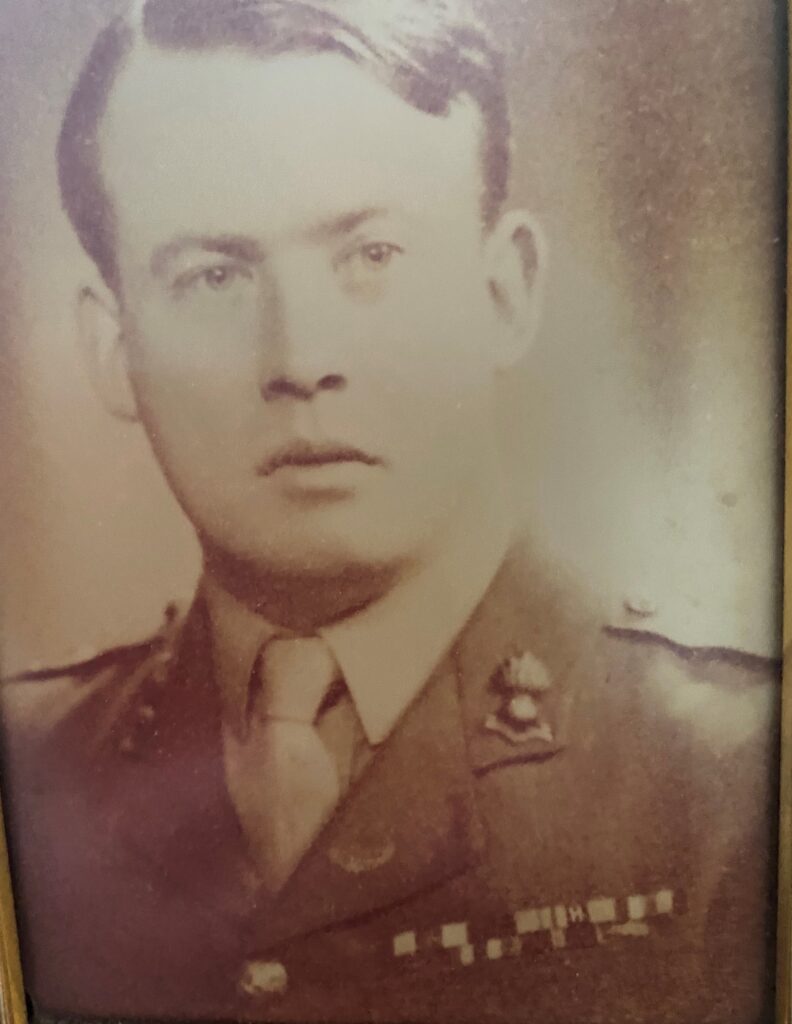
This Thursday marks the 80th anniversary of D-Day – the successful allied invasion of the beaches of Normandy on 6 June 1944, which played a crucial role in liberating Western Europe from Nazi occupation. D-Day was the largest seaborne invasion in history – codenamed Operation Neptune – it was of unprecedented scale and involved the coordinated efforts of more than 155,000 troops supported by 11,500 aircraft and 6,900 naval vessels in an assault on five Normandy beachheads: Utah, Gold, Juno and Sword. On 5 and 6 June 2024, the UK will commemorate this significant anniversary with a series of major commemorations and events across the UK and France to honour the brave soldiers who risked their lives for freedom and peace.
One of our Honorary Representatives (Hon Reps), Peter R. Johnson, who supports our OA beneficiaries on a voluntary basis, has shared the story of his father’s first-hand experience of D-Day and subsequent VE-Day.
“Born in 1952, of course I have no personal memories of World War Two. However, as a youngster, the legacy of the war was always apparent, from bomb sites for playing on (and their development as car parks – later National Car Parks), austerity and ration cards (although, only a baby, I had one issued, which I still have today), and of course, my parents’ generation had all gone through the war and it remained a very vivid and sometimes painful memory for many. Turning to D-Day and VE-Day specifics and the experiences of my father in particular, he served as an officer in the Royal Artillery throughout the war. He fought in North Africa, Greece, Crete, Syria, North Africa again, Sicily, Italy and back to the UK for the campaign in North West Europe, from Day-Day until victory in May 1945. This included Arnhem and the crossing of the Rhine. He was very lucky to avoid any serious wounds, but was hospitalised on several occasions with malaria and jaundice. He collected an MC, Mention in Despatch and US Bronze Star along the way.
My father’s experience of D-Day, saw his regiment, 64 Medium Regiment Royal Artillery, equipped with 4.5 and 5.5 inch howitzers, and part of 5 Army Group Royal Artillery. They did not land on Day-Day itself. Instead, on 5 and 6 June, the regiment were in transports in the Channel area, awaiting the move to the beaches, but also acting as a decoy to convince the Germans that the assault was intended for the Pas de Calais area. Father, who rarely talked about wartime experiences, did disclose that he found it a very unpleasant experience to be sitting in near stationary shipping, all packed full of men, vehicles and ammunition, being shelled by shore batteries in France. He didn’t like being a decoy who could not shoot back! Father landed on D+1 and his battery of the regiment was soon in action. Sadly, they had their first casualty that first night – a very young Gunner died having had his water bottle filled by a kind-intentioned Normandy farmer. The very rough and powerful calvados was too much for the teenager and he succumbed to the effects of the alcohol and was found dead in his tent in the morning. My father had to write to the imminently distraught mother to explain the cause of death of her young son – and clearly could not report what really happened for fear of distressing her further. So he wrote that her son had died on operations, within the sounds of the gunfire of the front, with his face to the enemy. All true, and for the last bit his head had been found facing the direction of the front line.
On VE-Day, father had been seconded to take control of a Displaced Persons’ camp (mainly Poles) close to the border between British and Russian forces. He had a mere 8 soldiers with him to control this mass of humanity (thousands). It was a hard job keeping them in camp and stopping them from breaking out and terrorising the local German population, or tackling the Russians, so close by, who the Poles loathed. He told me there was no entertaining or celebrations possible the night of 8 May 1945 (Victory in Europe day), or on the days since.”
Peter R Johnson








